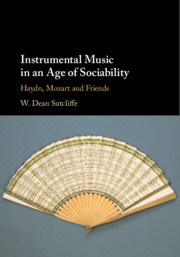2 - Reciprocity
Published online by Cambridge University Press: 19 September 2019
Summary
Expands on aspects of ‘technical sociability’, which is underpinned by principles of reciprocity and periodicity, both involving forms of binary organization. These include what I dub the gracious riposte, a recurring behavioural pattern in which assertive and conciliatory gestures are juxtaposed. The commonly applied language model, involving the interpretation of music as ‘conversational’, is reviewed, and I also discuss the rise of the sharply memorable musical motive in the music of this time. This leads to a section on thematic interaction, whereby musical materials themselves, rather than players or instruments, may be heard to ‘converse’ with each other. Sometimes, though, the contrast between them suggests less a fruitful exchange than simple incompatibility. I then consider topic theory as a means of controlling our impressions of such diversity of musical materials, noting both its positive and its limiting aspects. To conclude, I consider the encompassing term ‘variety’, a desideratum of the time, which could, once more, be accounted a virtue or a vice.
Keywords
- Type
- Chapter
- Information
- Instrumental Music in an Age of SociabilityHaydn, Mozart and Friends, pp. 55 - 266Publisher: Cambridge University PressPrint publication year: 2019

